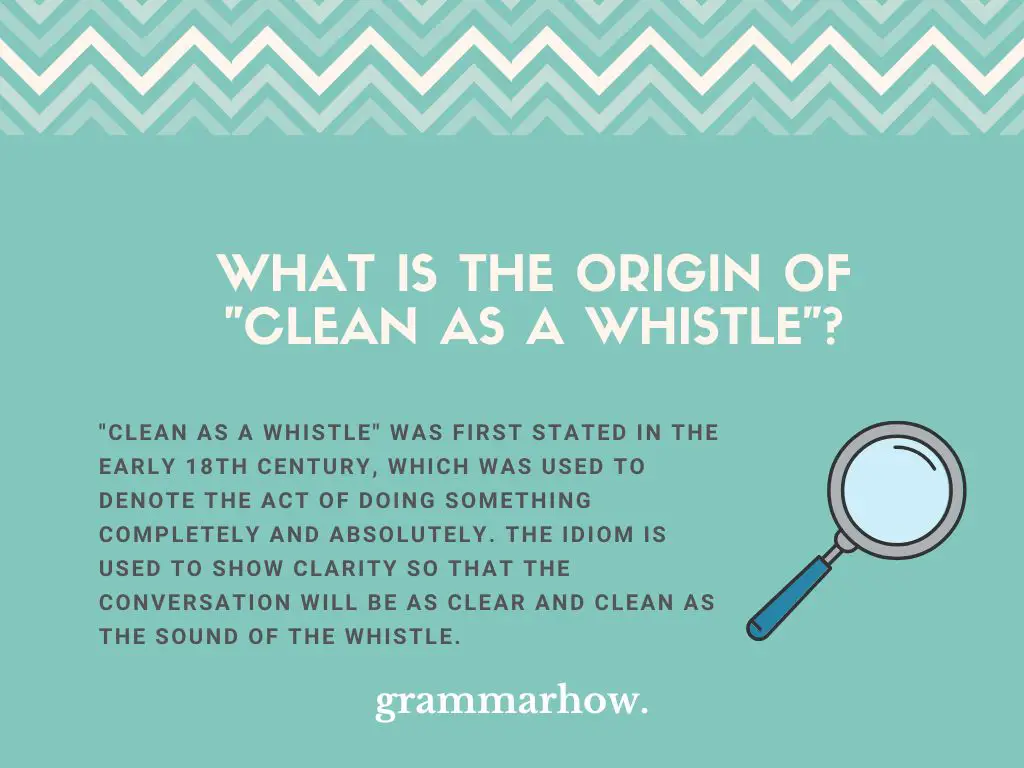“Clean as a whistle” is an idiom used in English sentences that help to emphasize the action carried out in those sentences. This article will explain the origin, the meaning, and how the idiom; “clean as a whistle” can be used in a sentence.
What Is the Origin of “Clean as a Whistle”?
“Clean as a whistle” was first stated in the early 18th century, which was used to denote the act of doing something completely and absolutely. The idiom is used to show clarity so that the conversation will be as clear and clean as the sound of the whistle.

Others like “slick as a whistle” and “sharp as a whistle” were also used in the 18th century. However, the original word is “clear as a whistle”, coined from the ability of a whistle to make a distinct sound that pierces the silence and can be heard even when blown in a noisy environment.
As of Today, the idiom “clean as a whistle” denotes more than what it meant in the 18th century and can be used in sentences to give different meanings based on the context of its usage.
What Does “Clean as a Whistle” Mean?
“Clean as a whistle” is an idiomatic expression that means entirely clean and dirt-free, judging from its appearance. It also means that the subject in question is clear and spotless. It can also be used to define action as being well-behaved, innocent, and legal.
The idiom “clean as a whistle” can have two contextual meanings, one in the sense of being clean and the other; in the sense of being actionable.
Both are used based on what the sentence intends to communicate and are used to denote the best of both contexts.
When “clean as a whistle” is used in a cleanliness context, it means the person or object in question is totally clean and without any dirt or tarnish. When used in the actionable context, it means the person we are talking about is free of guilt, innocent, and not involved in wrongdoings or illegal things.
To explain this better, the following example sentences are provided to illustrate how they can be used in both contexts;
Actionable context
- The Samurai has exceptional skill with his katana. He cut as clean as a whistle when training.
- Whenever he was accused of stealing and reported to the sheriff, he always walked away as clean as a whistle because of his good reputation and justified reasons to prove himself innocent.
- When the Police interrogated him, they were shocked he is as clean as a whistle, apart from the fact that he had no criminal record, so they released him afterward.
Cleanliness context
- Although the pendulum wall clock looks archaic, its custodian kept it as clean as a whistle.
- The floor was as clean as a whistle after we did our laundry and house cleaning.
- The Hotel needs to be as clean as a whistle before our guests arrive because our reputation is at stake.
Is It Clean or Clear as a Whistle?
“Clean as a whistle” and “Clear as a whistle” are both correct. Although “clear as a whistle” is an old word that was used to denote more of actionable activities before it evolved to “clean as a whistle”, the one we are more familiar with today.
“Clear as a whistle” was used in the old centuries to denote more actionable activities like cutting trees and following a thorough and clear methodology of doing things.
This is because of the comparison between the way they want the action to be compared to how clean and clear the sound of a whistle is.
“Clean as a whistle” is an evolved version of “clear as a whistle” that gives meanings that are more defined as compared to “clear as a whistle”. Its references are major “cleanliness” and “actionable”.
Therefore, “clear as a whistle” is obsolete, and “clean as a whistle” is modern. Still, both are correct when used in a sentence.
“Clean as a Whistle” – Synonyms
“Clean as a whistle” has two contextual meanings when used in sentences. The following are the synonyms of “clean as a whistle” in both references.
Actionable context
- Completely Innocent
- Cut and dry
- Clear as a whistle
Cleanliness context
- Entirely clean
- Sparkling clean
- Extremely clean
Final Thoughts
“Clean as a whistle” means when a person or thing is completely clean or when a person is well-behaved. Both meanings are correct. It is also a reinstated form of “clear as a whistle”, although both are still very much in use.
